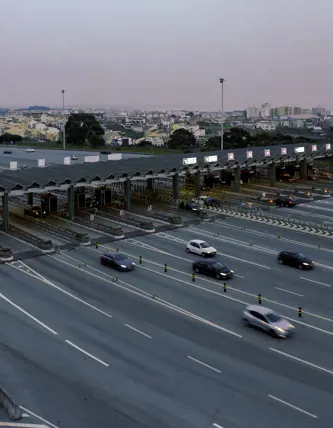
About us
Discover our purpose, values, vision and history.
Sustainable Development Goals
Find out about the Sustainable Development Goals (SDGs) that are a priority for the Brisa Group.

The 11 priority SDGs for the Brisa Group
The Sustainable Development Goals (SDGs) are one of the priorities for the Brisa Group sustainability strategy.
Based on internal analysis and assessment, cross-referenced with stakeholder mapping, and the materiality analysis conducted, Brisa Group has identified 11 SDGs that are more connected to the business’s benefits, impacts and prospects.
Health and well-being (ODS 3)
In addition to the health and well-being of its workers and core direct partners, who provide the operation and maintenance activities for the concession motorways, Brisa Group is working to achieve the European Union's new goal for the decade 2020-2030 of reducing by 50% the number of deaths and serious injuries. For this specific Road Safety target, Brisa Group has invested €46.1m in 2022 in the preservation and maintenance of its motorway network, continued high standards of assistance and traffic management, promoted communication and awareness actions and collaborated with public authorities in improving accident prevention and mitigation systems.
Gender equality (ODS 5)
Brisa Group is committed to achieving gender equality, with the following strategic objectives: reach the goal of having women in 30% of leadership positions by 2030 and double the number of women in first-line management positions by 2025.
Clean and affordable energy (ODS 7)
In its Energy Transition Operations, Brisa Group has defined a set of strategic principles, including combined energy efficiency solutions, to be implemented in a phased and scheduled manner. In this context, in 2022 Brisa Group completed a project to implement Energy Efficient street lighting across the concession: replacing lighting equipment with LED technology. Furthermore, in the course of 2022, it produced a thorough analysis of the areas likely to receive installation of photovoltaic panels (which is expected to start in 2023). Alongside these actions, a study has also been conducted to electrify some types of vehicles in the operational fleet, notably in Roadside Assistance.
Decent work and economic growth (ODS 8)
Brisa Group has developed a programme to balance work and personal and family life. In this context, it engages in ongoing activity in the field of occupational health and safety, for its employees, core service providers and also in the value chain, with a view to reducing the number of accidents at work. In order to protect the employees who are most exposed to activities with a higher risk (roadworks), a project to introduce Truck Mounted Attenuators (TMAs) has been developed: TMAs are equipment that absorbs energy in the event of a possible collision. Alongside this measure, significant changes have also been made to improve roadworks signalling.
Industry, innovation and infrastructure (ODS 9)
Innovation is inherent to Brisa's Group business model. It is a source of high service levels and high operational efficiency, from the design and operation of motorways, to the development of new mobility services, including traffic management based on intelligent systems.
In this regard, Brisa Group relies on several business units for cooperation. Via Verde, in the context of toll and mobility services, challenges the Group's technological capacity.
A-to-Be incorporates developments into its technology solutions portfolio. The Technology and Systems Directorate integrates new solutions into production environments. Finally, Grow Mobility identifies start-ups that can develop pilot projects that add value to the Group.
Brisa Group annually invests in maintaining and updating the motorways that make up its concession, ensuring the usefulness of the infrastructure as an access and development factor for the communities it serves.
The continuously investment in innovation with regard to its infrastructure, equipment and services, information systems and connectivity.
Brisa Group has developed a new network of fast and ultra-fast electrical charging points in service areas, enabling it to contribute to the transition to electric mobility as a solution for decarbonising traffic on its motorways.
Reducing inequalities (ODS 10)
Currently, Brisa Autoestradas infrastructure network covers the “backbone” of the Portuguese road system, contributing through its activity to connecting the interior to the coast, and reducing inequalities by promoting everyone’s social, economic and political inclusion. For this reason, one of Brisa’s Group strategic pillars is to partner with the State to connect people and communities, be territorially cohesive and build the mobility agenda. Brisa Group is also committed to ensuring equal opportunities and reducing inequality in outcomes by providing the Code of Ethics and the salary ratio.
Sustainable cities and communities (ODS 11)
Brisa Autoestradas, which accounts for about 44% of the Portuguese motorway system, guarantees the smooth functioning of a network of safe and efficient motorways, promoting territorial cohesion and the conditions necessary for development and social inclusion. With people, convenience, comfort and
excellent service in mind, the Brisa Áreas de Serviço “comfort areas” offer varied food options with quality, speed and friendliness. Since 2017, Brisa Áreas de Serviço has renovated the service areas in the Brisa Autoestradas: network, under the Colibri concept, making them more modern and comfortable, and providing them with various Food & Beverage concepts tailored to the profile of the customers visiting the spaces.
For this reason, they began to use the name “comfort areas”, to highlight the focus on well-being and customer satisfaction.
Sustainable production and consumption (ODS 12)
The sustainability agenda defined in 2021 endorsed the strategic goal of implementing a 100% circular economy for purchases and supplies by 2030. During 2022, the Code of Conduct for Suppliers was developed, as well as a methodology for assessing suppliers according to ESG criteria. Alongside these initiatives, Brisa Group has been developing studies and solutions that aim to contribute to the circular economy of its processes, where the study on sustainable roads with the incorporation of recycled plastics should be highlighted.
Climate action (ODS 13)
Brisa Group has incorporated measures related to climate change into its strategy and planning, notably in decarbonising its operations and also in decarbonising road transport. The climate risk and opportunity mapping project continued in 2022, and the preliminary report has been drawn up and is expected to be published in 2023 in accordance with the recommendations of the Task Force on Climate-related Financial Disclosures. Additionally, in late 2022, Brisa Group sent its letter of commitment to the Science Based Targets initiative, having committed to adopting a carbon neutrality goal in line with climate science.
Protecting life on land (ODS 15)
In its Environmental Policy, Brisa Group commits to respecting the diversity of biological species and ecosystems, and sees biodiversity as a strategic area for environmental management.
Following the strategic objective agreed under the Sustainability Agenda - to ensure the recovery and
regeneration of biodiversity and ecosystems - in 2022 Brisa Group developed a medium-term strategy for biodiversity, natural capital and ecosystem service to be published in 2023.
By assessing nature-related impacts and dependencies, it was possible to update Brisa’s Group interface with nature. This starting point, with a hierarchical approach to mitigation, helped to lay the foundations for defining the biodiversity strategy, as well as its objectives and a Nature Positive action plan.
Partnerships for the goals (ODS 17)
Brisa Group has a history of collaborative and partnership work, with public and private entities, in areas as distinct as road safety, biodiversity protection and advocacy for sustainable development.